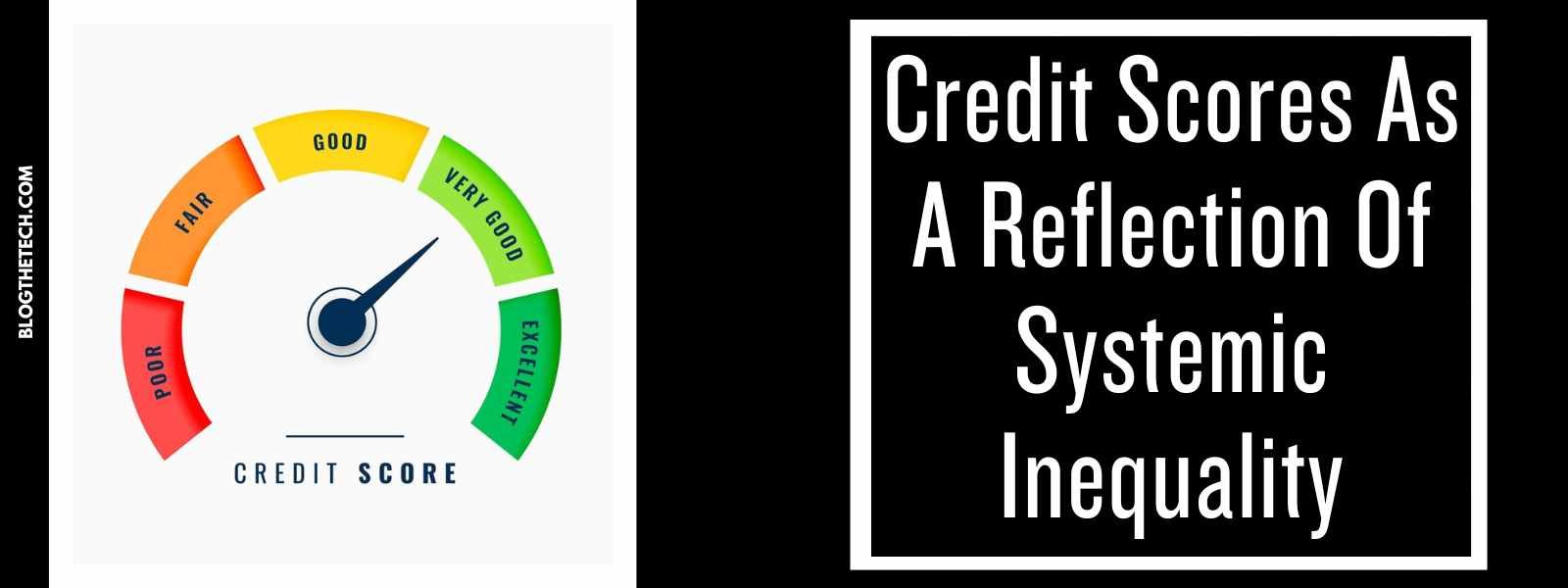Credit scores are often seen as a simple, objective tool that lenders use to determine whether you can borrow money or qualify for loans, mortgages, or credit cards. While they may seem like just a number that reflects an individual’s financial behavior, the truth is that credit scores tell a much deeper story. They are not just a personal reflection of financial habits; they also reveal the systemic inequalities that have shaped our economy over decades.
Credit scoring has long been criticized for perpetuating the racial wealth gap and economic divide in the United States. Disparities in credit scores reflect longstanding historical and ongoing discrimination, which affects access to financial opportunities for marginalized communities. Whether you’re applying for personal loans online or trying to secure a home loan, your credit score plays a huge role in the opportunities available to you. But for many, these opportunities have been hindered by factors that go beyond individual financial responsibility. Let’s explore how credit scores are more than just a reflection of personal financial habits and how they serve as a lens into the broader issues of inequality in our financial systems.
How Credit Scores Are Measured
To understand why credit scores can reflect systemic inequality, it’s important to know how they are calculated. Typically, credit scores are based on five key factors: payment history, credit utilization, length of credit history, types of credit used, and recent credit inquiries. These factors are meant to provide an objective snapshot of an individual’s financial behavior, essentially predicting how likely they are to repay loans based on past behavior.
While this may sound fair in theory, the reality is that credit scores are heavily influenced by factors beyond just the individual’s control. For example, people from historically marginalized communities may face barriers to accessing credit in the first place, such as redlining or discriminatory lending practices. Without access to credit, they cannot build the history that would boost their scores. For example, even if someone manages their money responsibly and pays their bills on time, they may struggle to build a good credit score if they’ve had limited access to credit opportunities, such as personal loans online or other lending options.
The Impact of Racial Disparities in Credit Scores
Studies have shown that there are significant racial disparities in credit scores. Black and Latino individuals tend to have lower credit scores on average compared to white Americans. These disparities are not simply a result of individual financial habits; they are deeply rooted in the history of racial discrimination and systemic economic inequality.
For instance, for many years, Black and Latino communities were systematically excluded from fair housing opportunities through practices like redlining, which denied them access to mortgages and credit. This lack of access to credit means that these communities had fewer opportunities to build credit histories, which ultimately affects their credit scores. Additionally, people from lower-income communities, where many marginalized groups reside, often face higher borrowing costs and are more likely to experience financial setbacks, which can harm their credit.
These systemic barriers have long-term consequences. Without the ability to build credit in the first place, many people from these communities find themselves trapped in a cycle of economic hardship. As a result, they are often denied loans, face higher interest rates, and struggle to gain access to financial resources that would allow them to invest in their futures.
The Wealth Gap and Its Connection to Credit Scores
The racial wealth gap is another key factor in the disparities seen in credit scores. The wealth gap refers to the unequal distribution of assets among different racial groups, with white families typically holding significantly more wealth than Black and Latino families. This gap plays a major role in why credit scores tend to be lower in marginalized communities.
Wealth is often a buffer that helps families weather financial storms, such as medical emergencies or job loss. For those with limited wealth, any financial setback can lead to missed payments, increased debt, and a damaged credit score. This is compounded by the fact that wealthier individuals and families can more easily access financial tools like personal loans online or invest in assets that appreciate in value, like homes and stocks. In contrast, marginalized communities often have less disposable income to save, invest, or build credit.
The accumulation of wealth, such as owning property or building investments, is a direct way to improve financial security and credit scores. However, with the racial wealth gap, this opportunity is not equally available to everyone. As a result, communities that have been historically excluded from these opportunities are at a disadvantage when it comes to achieving financial stability and improving credit scores.
The Cycle of Credit Denial and Limited Opportunities
One of the most harmful aspects of the credit system is that once a person’s credit is damaged, it becomes even harder to recover. People with low credit scores often face denial when applying for loans or credit, and when they do get approved, it’s usually with higher interest rates or worse terms. This creates a vicious cycle, where low credit scores make it more difficult to access credit or secure a loan, which in turn makes it harder to improve their financial situation.
For example, individuals with low credit scores might be denied personal loans online or face high fees and interest rates on any loans they are approved for. This can prevent them from making necessary purchases, like buying a car or home, or even paying for education or healthcare. Because of these barriers, people in marginalized communities find themselves stuck in a cycle of limited financial opportunity, which further perpetuates the wealth gap.
Why Reforming the Credit System Is Necessary
Given the way credit scores reflect systemic inequality, reforming the credit system is essential to creating a more equitable financial landscape. There are several ways that this could be done, including:
- Improving Access to Credit: Making it easier for people in marginalized communities to access credit is a crucial step in closing the racial wealth gap. This could involve providing alternative credit scoring models that take into account factors like rent payments and utility bills, which are often paid on time but not included in traditional credit scoring models.
- Addressing Historical Discrimination: Efforts to correct discriminatory lending practices, such as redlining and predatory lending, could help create more equal access to credit. This would allow people from historically underserved communities to start building credit and break free from the cycle of financial exclusion.
- Education and Awareness: Increasing financial literacy and awareness about credit scores can empower individuals to make better financial decisions and avoid falling victim to predatory lending practices. Understanding how credit works and the steps to improve it can help people take control of their financial future.
Conclusion: The Need for a More Inclusive Credit System
Credit scores are not just a measure of financial responsibility; they also reflect deeper societal issues like systemic racism, the racial wealth gap, and the unequal access to financial resources. Understanding the ways in which credit scores perpetuate inequality is the first step toward creating a more inclusive and fair financial system.
By acknowledging the systemic nature of credit disparities, we can begin to address the root causes of inequality and push for reforms that create equal opportunities for everyone—regardless of race or socioeconomic background. Only then can we ensure that credit scores serve as a true reflection of an individual’s financial habits and not a reflection of the systemic barriers they face.





